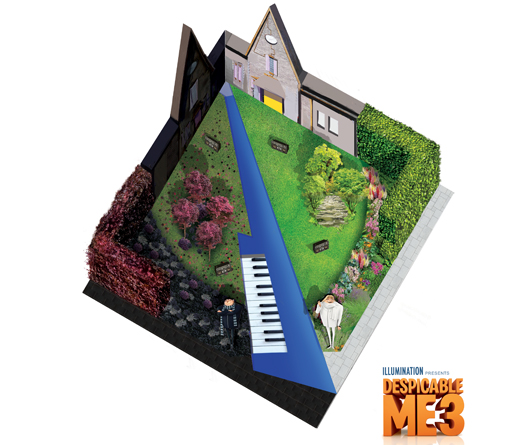![]()
Do you save your seeds? I remember visiting a friend years ago and being fascinated by the way she held brown envelopes under fading flower heads, shook them over the open paper and let the seeds fall gently inside.
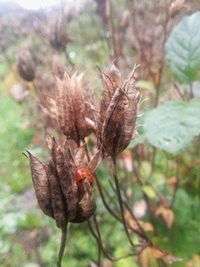
This was a practice I was unfamiliar with. It impressed me that she knew which flowers were ready to share, which ones she could open or shake. It seemed such a knowledgeable thing to do and I was in awe of her gardening prowess. In that brief moment, gardening became more than just pulling weeds, it became a fascination.
Years later I was tidying the garden, automatically deadheading the Calendula flowers without really thinking when a voice behind me whispered “aren’t you going to save the seeds?” I stopped and looked down. There in my hand was a palm full of curly little seeds. I laughed, “Of course! Thank you for reminding me!”
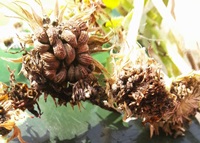
All the community gardens I work with grow beneficial edible flowers such as Borage, Nasturtiums, Calendula and Marigold alongside the vegetables so saving seeds not only means we will enjoy the flowers in later years, we’ll also save some of the precious funds.
Thankfully Ireland has experienced a relatively dry summer so seed heads have had an opportunity to set and not rot on their stems as in previous years. If you look around your garden now you might notice several plants ready to continue on to the next stage of nature’s cycle. Poppies, aquilegia, foxgloves, lupins and honesty are all ready to be shaken if you didn’t tidy them out of your garden once the blooms had faded.
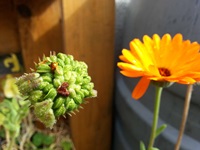
A word of warning though. If certain big corporations get their way, we may not be able to save our own seeds for much longer.
On 6th May 2013 an EU directive was issued restricting the sale (and therefore saving) of unlicensed seeds which effectively reduces the varieties that are available to the public. Thankfully, after some serious petitioning and in particular a flurry of last-minute lobbying from concerned heritage and organic groups, as well as some well-informed MEPs and people, the directive was amended.
Business’ with less than 10 employees and an annual turnover of less than €2m and individual growers are now permitted to save and swap unapproved seeds and supply or sell them. We’ve been saved from the blanket ban that was originally drafted.
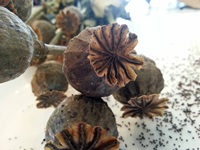
But (there’s always one of those isn’t there) there are clauses in the directive that state that ‘some agreed key concessions’ (of which the above is one) can be removed in the future without returning to the Parliament for a vote.
Just a second, we’ll back track there for a moment. Everything that’s been agreed can be un-agreed with no consultation or warning? In my naïvety I thought we lived in a democracy…?
Thankfully, when ridiculous directives are passed, human beings will try to find ways around them. I was impressed by the idea The Real Seed Catalogue came up with when trying to find ways to protect the heritage collections a while back. They set up a seed club whereby 1p from every order paid for a year’s membership so they’re not selling to the public. However, the UK are now enforcing the regulations so they’ve taken legal advice. For the moment, some of the seed packets they’re selling are labelled “amateur seed not for commercial exploitation” but there’s always the possibility that will be challenged.
A page on the Real Seed Catalogue’s website explains why they’ve chosen to do this; here’s a snippet which explains the dangers of the new EU seed directive:
“In the EU, there is actually a list of ‘official’ vegetable varieties. And a law governing seed sellers, which states that if a variety isn’t on the official list, then seed companies cannot ‘market’ the seed to anyone. In an immediate sense, this law only affects us, not you – because there are no laws at all governing the buying of seed or what vegetables anyone can grow. Selling unlisted seed? – that’s against the law. Buying unlisted seed? – that’s completely fine! So we should stress that for you it’s perfectly legal to buy any seed you like, plant it, grow it, and do whatever you want with it.
But this system does affect home gardeners in the long run – because it costs money to put/keep varieties on the official list. So it’s only profitable to ‘keep listed’ varieties that sell in huge quantities to farmers, who have very different needs to home growers – a farmer wants their plants to respond to precise chemical inputs, fruit all at once for ‘once-over’ harvesting, and be tough to stand up to transport and packaging. You on the other hand, want tender vegetables produced over a long season, even during variable years.
It’s just not worth listing seed for home gardeners. Hundreds of thousands of old heirloom varieties (the results of about eleven thousand years of plant breeding by our ancestors) have been lost forever, due to this rather poorly drafted EU legislation.”
In those three paragraphs The Real Seed Catalogue have succinctly explained why we should be worried by the directive and why we need to learn how to save our own seeds.
Home growers may have been spared on this occasion, but its quite possible our choices will be restricted over the coming years.
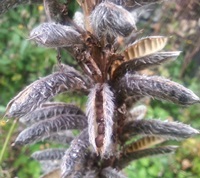
I’m incensed by the way large multinational corporations are governing what we grow and therefore as nations what we eat. It appears they’re doing so with little interference from our elected governments and with active support from the European parliament. I don’t imagine for a minute the issue of seed sovereignty is over, though I’d sincerely like to believe it was.
So what can we do? If you want to know more about saving seeds check out the fact sheets from The Real Seed Catalogue offering instructions or attend a seed saving workshop such as those run by Brown Envelope Seeds in West Cork, The Organic Centre in Leitrim or Irish Seed Savers in County Clare where you’ll receive hands on expert advice. In 2016 the next round of amendments are scheduled to take place so make a long term diary date to keep abreast of the situation.
As for taking an interest in saving seeds, well you never know where it may lead you…

Dee Sewell – a horticulturalist and certified trainer who started Greenside Up in 2009 and teaches people how to grow vegetables. Dee specialises in working with community gardens but also offers workshops, allotment visits, consultations, horticultural therapy, afterschools clubs as well as local talks – she tailors her services to meet clients needs. In 2012 Dee launched a Seed Gift Collection containing varieties of vegetable and insect friendly flowers with the aim of getting more people growing. Dee’s blog was a finalist in the 2012 Ireland Blog Awards in the Eco/Green and Lifestyle Categories.
Source: Greenside Up – Save Your Seeds (While You Still Can) – Dee Sewell


